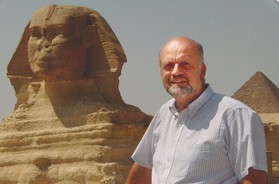 Back in 2003, Dr. Hassan Aref, dean of the Virginia Tech School of Engineering, generated national headlines by overseeing construction of what was then the world’s third fastest supercomputer — and the fastest university supercomputer in the world. Comprised of 1,100 Apple MacIntosh computers networked together, the supercomputer was known officially as “System X” and unofficially as “Big Mac.” System X was a triumph in more ways than one: Aref built the machine for about one-fifth the cost of supercomputers with comparable performance.
Back in 2003, Dr. Hassan Aref, dean of the Virginia Tech School of Engineering, generated national headlines by overseeing construction of what was then the world’s third fastest supercomputer — and the fastest university supercomputer in the world. Comprised of 1,100 Apple MacIntosh computers networked together, the supercomputer was known officially as “System X” and unofficially as “Big Mac.” System X was a triumph in more ways than one: Aref built the machine for about one-fifth the cost of supercomputers with comparable performance.
Next to Virginia Tech’s winning football team, System X probably did more to generate positive publicity for Virginia Tech than any other achievement in the university’s 130-year+ history. And it gave Tech scientists and engineers a valuable tool to assist in their research.
Barely one year later, in January 2005, Virginia Tech President Charles Steger announced that Aref would step down from his position as engineering dean, although he would stay on as a tenured professor. The university press release read like an accolade:
“Over the past two years, Hassan Aref implemented a number of changes that position the college for sustained growth and development in the years ahead,” said [Provost Mark] McNamee. “His leadership in faculty recruitment, curricular enhancement, the development of the System X supercomputer, and the launch of the new Institute of Critical Technology and Science, are significant achievements during his tenure as dean.”
Remarkably, there was no explanation as to why Aref was stepping down. Family reasons? Desire to spend more time teaching? No explanation whatsoever. I’m sorry, but it doesn’t add up. There’s a lot more to this story than was ever made public.
By all accounts, the new dean, Richard C. Benson, brings many strengths to the engineering program. Benson came from Penn State University, where he headed the Department of Mechanical and Nuclear Engineering. But the question lingers: Why did Aref step down?
“Who cares?” some may respond. “That’s ancient history.” No, it’s not. As documented in a recent post, “What is Happening in Hokie Town?”, Virginia Tech’s national ranking as an R&D powerhouse had been slipping between 2001 and 2003. The engineering school had been plagued by a series of short-tenured deans. But as vividly demonstrated by the System X coup, Aref created enormous excitement and buzz during his two years in office. I hear that he was extremely popular with engineering alumni, although he had trouble “managing up” — handling relations with the Virginia Tech administration in Burruss Hall.
Here is the question: Are Tech’s slipping R&D rankings during the early 2000s a momentary dip that can be blamed on temporary factors like the wrong dean or external causes such as state budget cuts? Or are there deeper, more pervasive problems? Virginians need to know. Virginia Tech is Virginia’s No. 1 research university, and it’s an economic anchor of Western Virginia. It’s too important for the Commonwealth to let fall behind.


